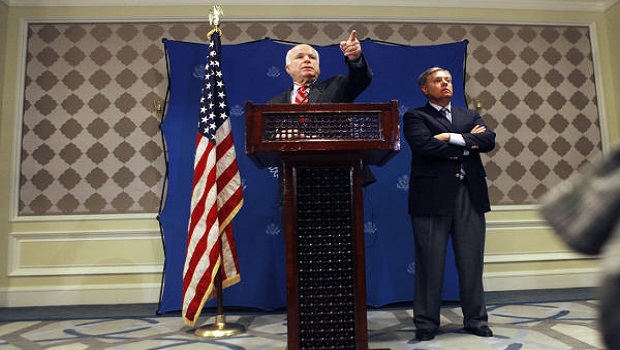
U.S. Senators John McCain, left, and Lindsey Graham, R-S.C., right, hold a press conference in Cairo, Egypt, Tuesday, Aug. 6, 2013. (AP Photo/Amr Nabil)
The two senators also held meetings with General Abdel-Fattah Al-Sisi and discussed developments in Egypt and the efforts to resolve the political crisis that has gripped the country since the ousting of Mohamed Mursi form the presidency at the beginning of July.
The American delegation said “the Brotherhood must not use violence,” and called on the interim government to release “political detainees,” and return to the path of democracy.
Meanwhile, Ahmad Al-Musalmani, media adviser to the interim president, spoke out against criticism of Egypt’s interim government, saying “foreign pressures have exceeded international norms . . . and Egypt is capable of protecting the revolution and the state.”
Spokesman for the interim government, Sherief Shawki, told Reuters: “There is a roadmap, which means that what happened was not a coup and that it was Egyptian people who decided on the roadmap.” Shawki also said the involvement of McCain and Graham was unwelcome, adding, “We don’t want foreign intervention to be imposed on us.”
McCain and Graham held a news conference yesterday in which they urged the parties of the Egyptian crisis to begin a national dialogue and avoid violence. They said the suspension of military aid to Egypt in response of deposing former President Mohamed Mursi would send the wrong signal at the wrong time.
McCain stressed said all parties should condemn violence, and called on the government to release all political detainees. He also said the government should hold a comprehensive national dialogue involving all parties, including the Muslim Brotherhood.
Senator McCain said the next stage in Egypt was critical, and would have a great effect on the future of the country and the Middle East as a whole. He added that the US will continue to support Egypt in every step.
Graham called on the Brotherhood and their supporters to end the protests in the streets and squares and to return to the political process, for fear of Egypt becoming a failed state. He told CNN before arrival in Cairo that the military must give power to the elected civilians.
He said: “Those in power now are not elected and those elected are in prisons. The situation is unacceptable.”
Cairo saw an intensive Arab and foreign diplomatic presence in the past week, all working to achieve a political settlement between the Brotherhood and the new government in Egypt.
However, the Muslim Brotherhood spokesman, Gehad El-Haddad said “the party’s stance was clear and it was the adherence to constitutional legitimacy,” a reference to its insistence on the return of Mursi as president.
Observers have expressed surprise at the strong comments made by the government about foreign interference at a time when they allowed foreign mediators to meet leaders of the Muslim Brotherhood.
The National Coalition for Legitimacy and Rejection of the Coup, which supports Mursi, meanwhile, expressed their appreciation for calls for calm and the initiatives which aimed at resolving the crisis, but stressed that “legitimacy must be restored, by the return of the elected president.”
The Coalition said “it valued calls for dialogue and calm from all parties inside and outside Egypt, and emphasizes that procedures to achieve calm must be preceded by a return of legitimacy, by the return of the elected president to his post, and the return of the dissolved Shura Council, which would restore calm. Then other issues could be discussed without any limits.”
In another development, London’s Financial Times has reported that Egypt’s interim government will introduce a number of short-term measures aimed at reviving the country’s struggling economy, which has suffered from more than two years of political turmoil.
Ziad Bahaaedin, deputy prime minister for economic affairs, told the Financial Times that immediate measures would include injecting liquidity into the economy by fast-tracking payments owed by the government to building contractors, restarting stalled projects, expediting critical infrastructure programs and activating a delayed World Bank employment program.
